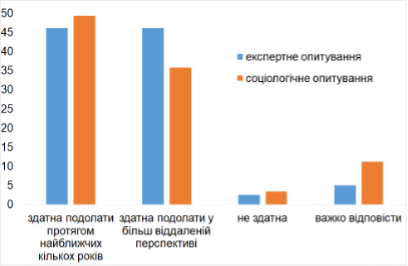This policy paper examines the results of three surveys: an expert poll and two public opinion polls, which were held by the Razumkov Center Sociological Service in the first quarter of 2023 as part of the MATRA Program project funded by the Embassy of the Kingdom of the Netherlands in Ukraine (the assessments and conclusions of the authors should not be seen as the official position of the Embassy). The expert poll was held on February 26 — March 15, 41 experts were interviewed (employees of scientific research institutes, experts in economics at the Ministry of Economy, city and regional administrations, etc.). The first public opinion poll was held on February 22 — March 1, the second — on May 23–31; in both cases, 2,020 respondents aged above 18 were interviewed in the territories controlled by the Ukrainian government and free of hostilities.
Such a choice of polls (expert and two public, "spaced" in time) allows us to clarify the relationship of the survey results, which more broadly reflects expectations of various economic agents.
First of all, let us recall the results of expert and public opinion polls conducted in February–March 2023 (for simplicity, we will refer to them as the February surveys). As indicated in our previous policy paper, both experts and citizens expressed quite high confidence in the country's ability to overcome the existing problems and difficulties. About 90% of respondents shared the opinion about the ability to overcome them in the coming years or in a more distant future (both experts and the public, chart "Results of February polls on the ability to overcome existing problems and difficulties").
Results of February polls on the ability to overcome existing problems and difficulties, % of answers

expert poll
public opinion poll
|
It can overcome in the next 3 years / |
It can overcome in a more remote future / |
It can’t / |
hard to say |
At the same time, citizens and experts similarly assessed the country's ability to overcome problems and difficulties in the next few years (49% and 46%, respectively), but citizens were less likely than experts to talk about the ability to overcome them in a longer term (36% and 46%, respectively), while pessimists (those who believe that Ukraine is unable to overcome existing problems and difficulties) were equally few among citizens and experts (3% each).
Lower estimates of overcoming problems in more than 3 years were associated with the fact that it is more difficult for citizens than experts to assess the developments in a more distant future, so among them more people hesitated (11% and 5%, respectively). Along with that, experts usually have much wider and deeper information (including non-public), which they can take into account when assessing certain processes.
Now let's compare the results of the February and May polls. Although the overall assessment of the ability to cope (in the near + more distant future) has practically been stable since the beginning of 2023 (85–87% of responses), the structure of the population's responses has undergone quite a noticeable change (table "Summary results of the May public opinion poll on coping with problems").
Summary results of the May public opinion poll on overcoming problems, % of responses
|
|
XII'22 |
II'23 |
V'23 |
|
It can overcome in the next 3 years |
49.9 |
49.4 |
43.0 |
|
It can overcome in a more remote future |
37.0 |
35.9 |
43.2 |
|
Generally, it can |
86.9 |
85.3 |
86.2 |
For example, while in February, the country's ability to overcome problems and difficulties in the next few years was reported by more than 49% of the population, and about 36% of respondents expected it to happen in a more distant future, during the May poll, the relevant estimates made 43.0% and 43.2%, i.e., within 2.5 months about 7% of respondents changed their opinion, assessing the terms of overcoming domestic economic problems somewhat more cautiously. Interestingly, that the results of the May public opinion poll "caught up" with the results of the February expert poll (each option of overcoming problems in the next three years and in a more distant future was reported by experts during the February poll at the same level — 46%).
There is no doubt that during the war, the lion's share of expectations directly depends on the course and nature of hostilities, which largely explains the "adjustment" of the public opinion. Say, at the end of winter and the beginning of spring, there were signs of preparation of the Armed Forces of Ukraine for a broad offensive, which was associated with the liberation of the country and the beginning of its recovery. Of course, this had a strong psychological impact on the opinions of the country's citizens, who (perhaps unconsciously) also expected a quick recovery of the country.
At the end of May (when the second public opinion poll was conducted), it became clear that the quick liberation of the territory of Ukraine is unlikely to happen. Therefore, remaining confident in the victory over the aggressor, the citizens adjusted (with account of the current realities) their position regarding the terms of complete liberation of the country and the speed of recovery.




